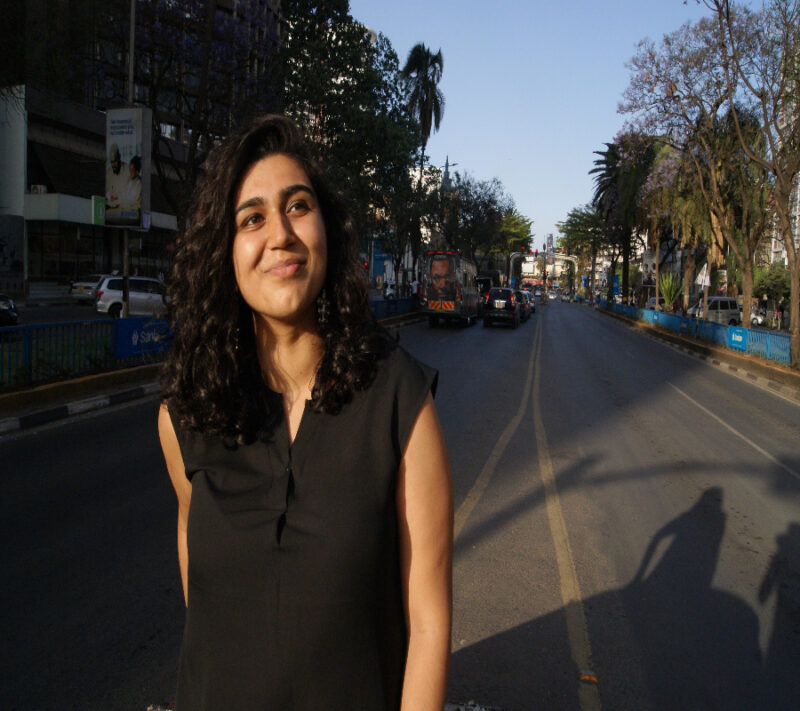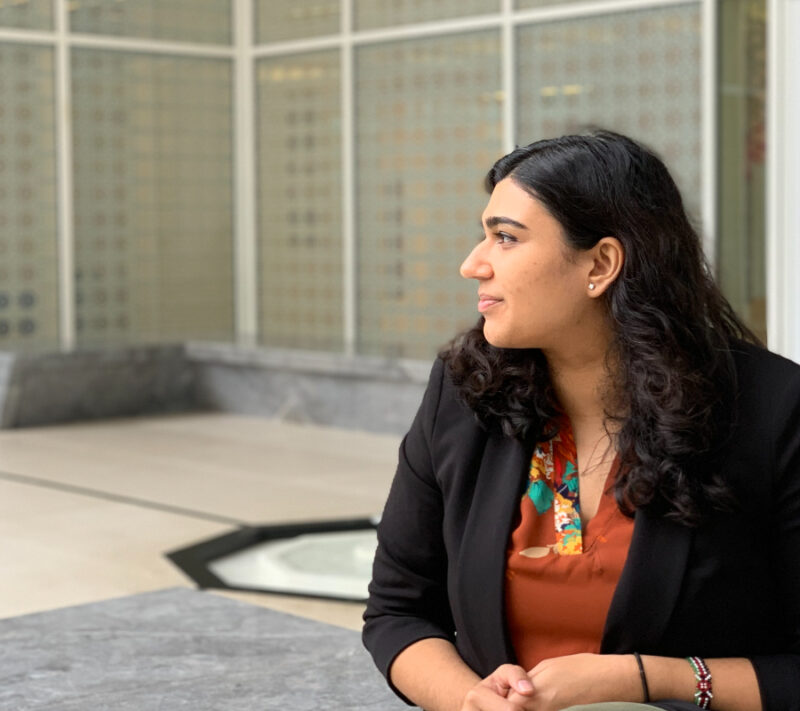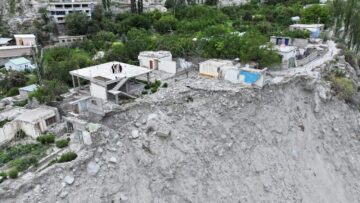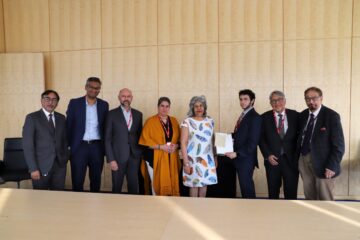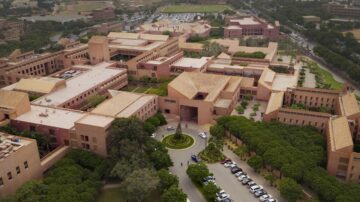This tribute to Nabila was written by her friends and classmates on the GPISH programme.
Nabila Walji was a student of the IIS’s Graduate Programme in Islamic Studies and Humanities (GPISH), writer, photographer, and anthropologist-in-training, born in Calgary, Canada, in 1993. She completed her early education in Edmonton and her undergraduate degree in Anthropology and International Development Studies at McGill University in Montreal, graduating in the top 10% of her class. In between her undergraduate and graduate studies, Nabila received the Aga Khan Foundation Canada International Development and Management Fellowship, an Engineers without Borders internship as well as other opportunities, which enabled her to work in various capacities in Nairobi, Kenya.
Nabila was the founder and manager of “Uniting through Differences”, a platform through which she worked at the intersection of education, media, culture and heritage for over ten years. As part of this effort, she established her Instagram page @nabilawanders where she used her photography and story-telling to engage followers in these conversations. She also co-founded “Brush Your Cheek. Save a Life”, an organisation that works towards addressing the lack of ethnic diversity in worldwide stem cell databases. In addition to serving as Communications Manager, she organised stem cell registration clinics worldwide to improve numbers.
Nabila was an avid volunteer and was involved in various capacities in different organisations. She tutored refugees in Edmonton, served as a volunteer for a local distress line in Montreal, and was a Youth Camp facilitator for Al-Ikhwan in Kenya and Global Encounters (GE).
Nabila pursued her graduate studies through the IIS’s GPISH programme, in the final year of which she was enrolled in the University of Oxford’s Visual, Material and Museum Anthropology MSc. She was active during her time at both the IIS and University of Oxford, volunteering with the IIS Alumni Working Group, Uncomfortable Oxford Tours, the Pitt Rivers Museum, the Oxford University Anthropology Society, and more.
She also loved capturing the world around her through her photographic lens, which lent us a window to look at the world through her eyes. Her most famous work “Unbelonging in my Fatherland” tells the story of her unique positionality in her homes: Canada, East Africa, and her elusive “fatherland”. She continued to explore this theme in her GPISH dissertation, which focused on the Ismailia Hotel in Nairobi, Kenya, and its role in the historical, urban, olfactory, and culinary fabric of the city.
IIS faculty members who taught Nabila remember her vividly as “one of the most promising students” who – in their words – “has touched so many with so many good things”; as “talented”, “bright”, “gentle”, “kind”, “modest”, with “an excellent mind” and “an eye for beauty”. Dr Laila Halani, Head of Graduate Studies at the Institute, said:
“Nabila embodied the struggle of belonging and unbelonging that many immigrant youth face today. She was unique in her ability to seamlessly integrate her intellectual and academic understanding with her creative and artistic expressions of her experiences that resonate with immigrant youth today. She was determined to bring these two strands together in her proposed doctoral studies which we discussed on several occasions including in March 2022, and I am confident that she would have made a unique and original contribution, if only …. The IIS, Oxford, and the community have lost a budding anthropologist, photographer, and much-loved student and colleague. We will miss her lively, creative, and warm presence.”
Dr Alex Henley, GPISH Programme Leader, said:
“Nabila was one of the first to show me what is so special about the IIS as a place for people committed to learning as a form of service. Whether we were talking about her research interests, career aspirations, or something as mundane as an essay deadline, Nabila always seemed to be guided by a strong moral compass, seeing the ethical dimensions of everything she did. When she came to see me about possible career paths in academia, we ended up chatting for hours about her main concern: on what path could she do the most good for others? As a teacher I always feel proud of a student’s success, but that day I felt honoured to have been given a small role in Nabila’s journey.”
But Nabila was much more than her resume and her accomplishments, though those were numerous. Nabila was also a sister, daughter, friend, wanderer, poet, traveller, artist, roadtripper, cat lover, ginan and qaseeda enthusiast, passionfruit yoghurt-eater, kuku paka aficionado, avid reader, box collector (but out-of-the-box thinker), stuffed animal connoisseur, global citizen, map analyst, cross-cultural communicator, problem solver, professional ideator, and multimedia storyteller.
Nabila spent, in her own words, “most of her days and nights … contemplating, researching and dreaming about societies and cultures”. She had the ability to see so much beauty in the mundane. She would stop while walking to admire a particular fallen leaf or make a new dog friend. Nabila would always contemplate things that most people take for granted. For instance, many fantasise about travelling through Europe and putting a checkmark on a list of European countries visited, but travelling, for Nabila, was instead a way to “understand one’s place in the universe”. She took inspiration from Ibn Battuta’s travelogue and tried to instil meanings in everything that she did. She found peace and joy in exploring her backyard and her neighbourhood, just walking, appreciating, and capturing moments that struck her.
Nabila also loved to get lost in the colours of her surroundings. She was completely in love with the world and enchanted by it. She would give names to her plants, her stuffed animals, even the spiders in her room. She could talk for hours about maps, Pakistani truck art, the sunsets in Nairobi and the photographs she had taken of the sunlight reflecting off of buildings there, the importance of public libraries, and watching the leaves change colour. She loved telling stories and she loved hearing stories. Nabila was so drawn to anthropology as a way of storytelling, especially when it came to stories that were less heard.
Nabila lived every day like she somehow knew it wasn’t promised. She prioritised her relationships over everything else. Nabila always endeavoured to see the best in people. She would constantly give people the benefit of the doubt. In the face of unkind or unfair behaviour, she tried hard to put herself in other people’s shoes to understand their position. She was balanced, kind and generous in her assessments of people, and was very vocal in appreciating the people around her. She never let anything else get in the way of being there for the people around her. She was kind in a way that left you feeling loved – she often wrote small snippets of encouragement for her friends when they were struggling and poured her love into notes she would send to us on days of celebration.
Nabila always tried to shed the “worldliness” that most of us find ourselves so entangled with. She radiated the kind of calmness that was contagious and practised, in her own words, “slowing down and listening, smelling, tasting, feeling and seeing what the world around us says about everyday life”. She had an observant eye and a kind and open heart to observe and understand both the obvious and the hidden in plain sight.
When Nabila’s grandmother, her Dadi ma, passed away, she wrote a touching tribute for her. It is as if a younger Nabila is telling us how to process her present absence. She writes of the beautiful intimacy of her grandmother’s loved ones gathering under one roof, and then going to watch the sunset together. The new normal sets in, but the sun continues to fill the sky with colour. Nabila writes about reciprocal goodbyes. When we say goodbye, those who have left us find ways to respond. So, when we are saying goodbye, she is responding. In the sunset we can see her Dadi ma, and now her, shepherding us into the future—living on in our hearts, our memories, and our sunsets.
Nabila shared the feeling of uprootedness that seems so common in the diaspora. Not really belonging to here or there, not really having a home anywhere on this earth, or perhaps having too many. After a lifetime of looking for a home, Nabila has found one and she is there – in her eternal home writing little notes for her new neighbours, naming the spiders around her, continuing to speak to us through the sunset, and filling the heavens with as much love and care as she filled our lives with.
…
The Nabila Walji Foundation has been set up by Nabila’s family as a living expression of its namesake’s passion for equity, social justice, and supporting vulnerable communities.

